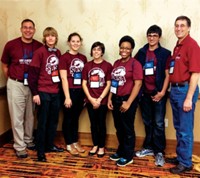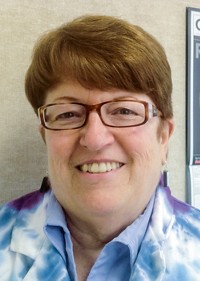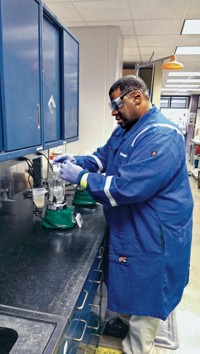Advertisement
Grab your lab coat. Let's get started
Welcome!
Welcome!
Create an account below to get 6 C&EN articles per month, receive newsletters and more - all free.
It seems this is your first time logging in online. Please enter the following information to continue.
As an ACS member you automatically get access to this site. All we need is few more details to create your reading experience.
Not you? Sign in with a different account.
Not you? Sign in with a different account.
ERROR 1
ERROR 1
ERROR 2
ERROR 2
ERROR 2
ERROR 2
ERROR 2
Password and Confirm password must match.
If you have an ACS member number, please enter it here so we can link this account to your membership. (optional)
ERROR 2
ACS values your privacy. By submitting your information, you are gaining access to C&EN and subscribing to our weekly newsletter. We use the information you provide to make your reading experience better, and we will never sell your data to third party members.
Undergraduate Education
Louisiana State University’s ChemDemo program brings chemistry to the community
Outreach program has dispatched more than 15,000 college students to do hands-on activities in K–12 classrooms
by Linda Wang
April 22, 2018
| A version of this story appeared in
Volume 96, Issue 17

In 2001, when Tabitha Vu was an undergraduate chemistry major at Louisiana State University, she visited a local high school and gave a chemistry presentation, and then led the students in hands-on demonstrations.
That experience of participating in LSU’s ChemDemo program reinforced Vu’s passion for teaching. “It was a great experience going into a high school classroom and seeing what it would feel like to be a teacher,” she says. “It helped me figure out the path I wanted to take in my career.”
Vu, who now teaches chemistry at Dutchtown High School in Geismar, La., is one of more than 15,300 LSU undergraduates who have participated in ChemDemo, which was started more than 20 years ago by LSU chemistry professor George Stanley. Through the outreach program, LSU students have visited more than 7,300 K–12 classes and performed hands-on activities with more than 182,000 students. Undergrads at LSU who are taking introductory chemistry courses, as well as some upper-level chemistry courses, can opt to do ChemDemo for extra credit. In some courses, the instructor might require students to complete one ChemDemo visit, with extra credit given for additional visits.
Stanley says the program encourages service-based learning, which he defines as “taking what you are learning or have learned in lecture and transferring that knowledge to the community in a constructive way.”
Stanley started ChemDemo in the fall of 1997. He was inspired by his own feelings of satisfaction from leading hands-on activities for National Chemistry Week. He wanted to impart some of the joy and fulfillment he felt to the undergraduates taking his chemistry classes. Just as the catalysts he researches turn over to synthesize more and more chemical products, Stanley says, “I view my class as a way to take what I do and multiply it by a considerable extent.”
Through the program, LSU students are matched with K–12 teachers who have signed up for ChemDemo. Teams of up to six college students teach one or more 45-to-50-minute classes for the teacher, including a discussion of chemistry concepts and hands-on demonstrations.
“We don’t tell the students exactly how to teach the material. We give them some teaching tips and the chemistry concepts that they need to know, but how exactly they do it is up to them,” Stanley says. Every demonstration incorporates a discussion about safety when doing hands-on activities.
Elementary school students have tried their hand at synthesizing a Silly Putty-like cross-linked polymer by adding glue to a water-borax solution. They have also made ice cream using liquid nitrogen. High school students have learned about stoichiometry by making soap bubbles using various ratios of oxygen and combustible gases and then igniting them.
Over the years, the program has received financial support from local companies and organizations, including the Albemarle Foundation, the ACS Baton Rouge Local Section, Dow Chemical, ExxonMobil, BASF, and the Gordon A. Cain Center for STEM Literacy at LSU.

Connor White, a freshman geology major at LSU, says that participating in ChemDemo has increased his confidence in how well he understands the material he learned in class. “Once you start engaging with the students and they start asking you questions, you find that you actually know more than you think you know,” he says. “You’re able to relay the information in a way they can understand because you kind of know how they’re thinking and what makes sense to them.”
Advertisement
Briasha Jones, a sophomore premed student at LSU, says many students in the third-grade class she taught for ChemDemo asked her what being in college is like. She was touched when the students wrote her a letter afterward saying how much they enjoyed the experience. “It’s important to give back to students because they’re our future,” Jones says.
For the K–12 teachers, ChemDemo has complemented their curricula. “It provides my kids with different experiences than I would give them normally,” says Carolyn Feinberg, a chemistry and biology teacher at Baton Rouge Magnet High School who also participated in ChemDemo when she was an undergraduate in Stanley’s chemistry class. A lot of the materials that ChemDemo volunteers use are either too expensive or difficult for a teacher to come by, Feinberg says, adding, “I can’t just go get liquid nitrogen as a teacher.”
Feinberg says she hopes ChemDemo introduces college students to the idea of teaching as a career option. “We need more chemistry majors to be teachers because there are a lot of teachers teaching chemistry who actually don’t know very much chemistry, and that’s a problem,” she says. “It would be so cool if we could get other universities to do this. It would really open the door for a lot more people to become chemistry teachers.”
Feinberg credits ChemDemo’s success to Stanley’s passion for teaching. “He really likes chemistry, and he wants to share his passion,” she says. “When you can share your passion with people of all walks of life and all ages, boy, that’s really something.”
Stanley, who is a 50-plus-year member of ACS, plans to retire from LSU in a couple of years. He says he does not know what will happen to the ChemDemo program after he leaves. He hopes, however, he has inspired enough students that they will keep alive the program’s spirit of giving back to the community.





Join the conversation
Contact the reporter
Submit a Letter to the Editor for publication
Engage with us on Twitter